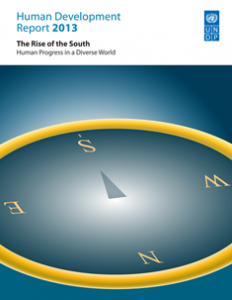Overcoming Poverty by Addressing Environmental Challenges
Apr 2nd, 2013 | By admin | Category: Climate ChangeBy Suzanne York, www.howmany.org
Last month, as a conference was taking place in Ethiopia on the potential of PHE projects (population-health-environment) to empower communities, the United Nations released its 2013 Human Development Report. This analysis assesses the status of health, education, and wealth in developing countries.
While the report, titled The Rise of the South: Human Progress in a Diverse World, stated that progress has been made in these areas, the UN also noted that this will be all for naught if there is no action taken on climate change, deforestation, and air and water pollution in the world’s poorest countries.
“Environmental inaction, especially regarding climate change, has the potential to halt or even reverse human development progress. “ The UN went on to say, “The number of people in extreme poverty could increase by up to 3 billion by 2050 unless environmental disasters are averted by co-ordinated global action.”
At the March PHE Ethiopia Consortium Annual General Assembly meeting, the participants understood all too well the connection between poverty, healthcare and the environment. Negash Teklu, executive director of the Consortium, mentioned throughout the conference that the PHE integrated approach is the way to save the environment and protected areas.
Yemeserach Belayneh, of the David & Lucile Packard Foundation, believes PHE projects are “a good way of engaging people on the climate discussion.” In her experience, PHE projects offer better protection of environmental hotspots.
Others agreed. Dr. Meshesha Shewarega, executive director of the Consortium of Christian Relief & Development Association (CCRDA), said his organization had begun to focus on reproductive health by integrating it with the overall PHE approach. CCRDA, he stated, “recognizes the interconnectedness between people and their environment.”
While PHE projects are relatively new in the development field, it is a promising way to reach the “last mile”, or the majority of the world’s poor who lack education and economic opportunities. PHE projects are designed to lift people out of poverty, enable empowerment, offer healthcare and sustainable livelihoods, and at the same time protect the environment.
Twenty-nine percent of Ethiopians live on $1/day or less. There are more than 34 million chronically hungry people in Ethiopia. The 2013 Human Development Report lists Ethiopia as one of the countries with the highest intensity of poverty. Overall, Ethiopia ranks 173rd on the HDI list, which is considered low human development.
Climate change and environmental degradation affects all countries, developed and developing. But for Ethiopia, joined by nations such as Zimbabwe, Afghanistan, and Mali on the low human development index, a changing climate will only further burden efforts to rise above poverty.
Ironically, as the impacts of climate change increase and become more severe, developed countries are not stepping up to aid developing countries. Despite agreeing in 2010 to support a Green Climate Fund – meant to raise $100 billion a year by 2020 to help developing countries counter and adapt to climate change – rich countries thus far have committed only $5.7 million.
Climate change and poverty are inextricably linked, along with issues such as women’s rights, health and population growth. When people and communities are supported and empowered, the chances of success are great. PHE is one solution that reflects how a multi-pronged approach to the most critical issues of our time can overcome adversity. The challenge is for the global community to step up and break down the existing barriers to development.
They can start by heeding this report that states “as global development challenges become more complex and transboundary in nature, coordinated action on the most pressing challenges of our era, whether they be poverty eradication, climate change, or peace and security, is essential.” It’s time to put action behind the words.
Suzanne York is a senior writer with the Institute for Population Studies.

